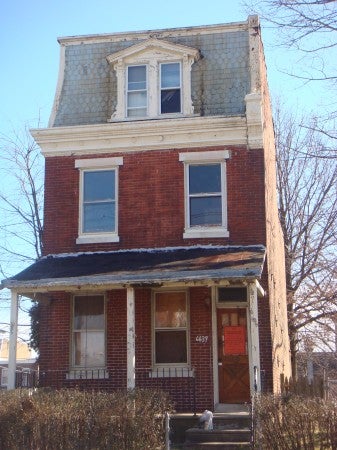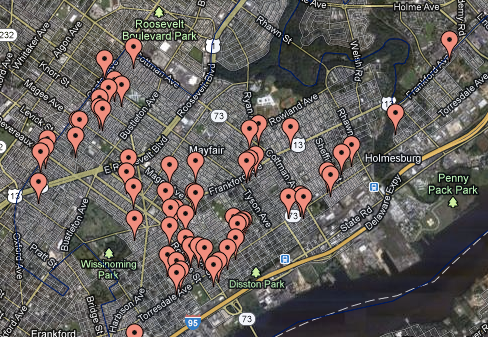Henon, Kevin Boyle develop plans to address neglected properties

It’s been an ongoing issue for the past several years, but Northeast residents and politicians alike are ready to continue fighting the absentee landlords and property owners that have been blighting various neighborhoods with their poorly maintained homes.
Rep. Kevin Boyle, D-172nd, called a hearing with the House Democratic Policy Committee Feb. 21 to develop new ways of dealing with the problem.
“I think for far too many years the city of Philadelphia has not tended to this issue,” Boyle said. “I felt the responsibility was on me to make sure that they know that this is as big of an issue affecting the Northeast as it is.”
The problem began in the last decade when properties in the Northeast were being advertised in New York, prompting New York residents to buy several of the houses to rent out. The owners then return to New York, leaving the property unmaintained. These houses can subsequently become stomping grounds for anything from vermin to kids to drug addicts.
“Crime has gone up significantly,” said Barbara Dooley-Rup, chairperson of the Northeast Quality of Life Coalition. “In the last 10 years, we’ve had an increase of drug use. We’ve had an increase of prostitution. If you live on a block that has an abandoned house, it becomes a crime house.”
Dooley-Rup, a resident of Tacony, was also present at the hearing. “There were some really good ideas put forth,” she said. “One of the things that was discussed was having an actual certified manager, so it’s not your first floor tenant or your second floor tenant.”
Philadelphia’s current law says that all properties must have managers, but the manager can be a tenant of the building. With new legislation, the city could require that owners who live a certain distance from their properties have certified managers or run the fines or loss of their driver’s licenses.
But the property owners from out of state are not the only contributors to this growing problem. There are cases where the homeowner has passed away and none of his or her family members want the house, but none want to sell it either, causing it to sit and deteriorate. Over time, the cost to repair the home builds up so much, it becomes almost impossible to sell. Some of these homes are either sold or the owners let it go into foreclosure, where it is then possessed by the banks.
But according to Dooley-Rup, it is sometimes impossible to find out who the house belongs to because the Board of Revision of Taxes site rarely shows updates on who owns the properties.
“It’s still a good place to be,” Dooley-Rup said. “Tacony’s still a great neighborhood. We have little pockets of bad blocks. Unfortunately, those bad blocks are growing.”
These bad blocks are not just in Tacony, but in various neighborhoods in the Northeast. Keystone Street, Ditman Street, Unruh Avenue and Marsden Street are just some of the blocks around Tacony where the problem is getting serious. Residents are directed to call 311 to report the issue, but a solution isn’t always that simple.
In one Tacony property, the back door was kicked in, allowing vermin including rats, mice, possums, raccoons, cats and skunks to take residence. In order for it to be sealed by the Department of Licenses and Inspections, the SPCA and the game warden had to take care of the animal problem first. By the time the L&I had come to seal the house, more critters had found their way in, causing the cycle to keep repeating.
Licenses & Inspections deals with hundreds of these properties a week.
“We feel it is very important that all property owners take care of their properties up to the property maintenance code,” L&I Director of Strategic Initiatives Maura Kennedy said. “That is their responsibility as property owners and that is the focus of our department, to make sure that we hold those property owners accountable for the state of their property.”
While Kennedy said L&I typically responds to 311 calls the next day or the day after, it does prioritize calls depending on the safety threat the problem poses. Sixth District Councilman Bobby Henon attributed slow responses to the slash in the L&I’s budget due to the recession.
“L&I doesn’t have all of the enforcement resources,” Henon said. “Enforcement does count. It does help for the quality of life.” Henon, who, along with Boyle, has made absentee landlords and blighted property a focus of his campaign, has started the “Bad Neighbor Initiative.”

The initiative is in response to the budget problems that have hindered government agencies like L&I and the Community Life Improvement Program from doing as much as the city requires of them. It calls the residents to action, Henon said, encouraging them to speak up and participate in reporting any negligent property owners they observe.
For the next month, Henon will be on a campaign to inspire residents to call out their neighbors’ irresponsible behavior. Additionally, he’ll publicly identify owners who have had multiple violations, hopefully bringing them to comply with the law. His website hosts a map of properties within the 6th Council District that have tax delinquencies, rental citations and multiple L&I citations.
Henon said he’ll also be working closely with Boyle to bring greater awareness and attention to these negligent property owners by being vocal and pressuring the city, calling hearings and being aggressive with property owners.
“I’m making the argument that if we don’t tend to the situation now, we’ll not only be dealing with negligent property owners in a decade,” Boyle said. “We’ll also be dealing with abandoned properties and that’s what we need to avoid. We need to keep this a strong, stable, working-class, blue-collar neighborhood.”
Maryline Dossou and Matthew Flowers are students reporting for Philadelphia Neighborhoods, the publication of Temple University’s Multimedia Urban Reporting Lab.
WHYY is your source for fact-based, in-depth journalism and information. As a nonprofit organization, we rely on financial support from readers like you. Please give today.




